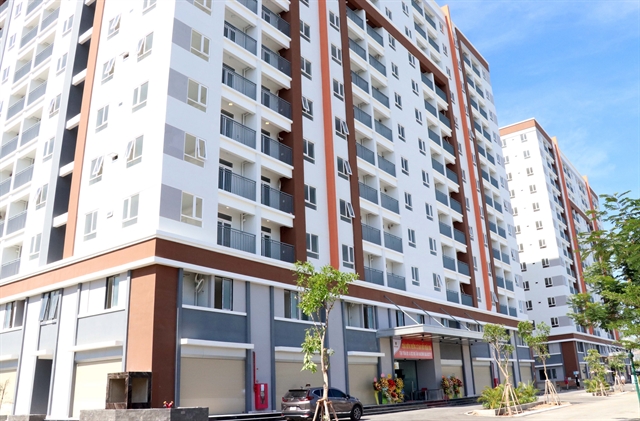 Economy
Economy

 |
| Blocks of social housing apartments in Ninh Thuận Province. The completion of some huge social housing projects this year is expected to boost sales in the market. VNA/VNS Photo Công Thử |
HÀ NỘI — The Vietnamese real estate market showed mixed results in 2022 with a boom in the first half of the year and a downturn in the second half, according to Nguyễn Mạnh Hà, deputy chairman of the Vietnam National Real Estate Association.
Hà was speaking at the seminar 'Vietnamese real estate: outcome and outlook' on Tuesday.
The deputy chairman said the tide of cheap money in late 2021 had lifted many boats in the early months of 2022, including real estate. Housing prices were soaring on the back of the post-pandemic economic recovery and the growing demand from homebuyers.
However, the industry began to go into reverse in the late months of the year as a result of a change in the governmental stance on bank credit and corporate bonds. The government's tightening up on the two capital channels has caused worries among investors and brought it to a halt.
"The number of estate agents now stands at around 30 to 40 per cent of that in the early half of 2022," said Hà.
Still, he has an optimistic outlook for the industry in the short term as the completion of some huge social housing projects this year is expected to encourage sales to low-income homebuyers.
Nguyễn Mạnh Quỳnh, chief of staff of the Vietnam Association of Realtors, held that the supply of commercial real estate was tight in 2022 with around 48,500 products for sale, equaling just 28 per cent of the figure in 2018.
"The market was facing a shortage of affordable housing and, at the same time, witnessing a surge in luxury housing," said Quỳnh.
By product types, land slots took up 44 per cent of the pie and high-end housing followed with 37 per cent. Middle-end housing came next with 15 per cent whereas low-end apartments stayed at rock bottom with 4 per cent.
The chief of staff forecast that real estate sales would remain low in Q1/2023 but begin to improve in Q2/2023 on the grounds of a better macroeconomic situation. Average prices, meanwhile, are expected to fall slightly until mid-Q2 and then level off towards the end of the year.
Phạm Lâm, chairman of the DKRA Group, revealed that 1,081 real estate enterprises were dissolved and 2,379 temporarily ceased their operation in the first 11 months of 2022.
The situation is not better now as real estate enterprises face many setbacks. One of the setbacks is the tight supply of land, which falls between 40 to 83 per cent year-by-year across segments.
Lâm urged the enterprises to cut costs and cut staff wisely to get through this tough time. He said digital transition is a solution to the cost-saving problem as it significantly reduces overheads.
"My message for the enterprises in 2023 is 'tighten your belts'," Lâm added.
Cấn Văn Lực, chief economist at the JS Commercial Bank for Investment and Development of Vietnam, estimated total capital funneled to real estate in 2022 at VNĐ507 trillion (US$21.5 billion), of which 71.0 per cent come from bank loans and 10.8 per cent from corporate bonds.
"Corporate bonds normally account for about 22 per cent of real estate capital. Unfortunately, this source of financing was reduced by half last year," said Lực.
The economist also revealed that he was urging the government to introduce a favourable mechanism to support the industry in its effort to repay VNĐ120 trillion worth of corporate bonds in 2023 and VNĐ110 trillion in 2024. —VNS